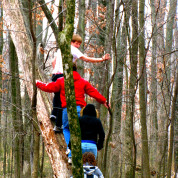
I spoke with Adya Shanti, a well-known spiritual teacher, about ten years ago, at an event in Vancouver. I told him that I felt that I had done more harm in my life through my efforts to love and help people than in any other way. He looked at me for a long moment when I said that, and then he asked, “Would you please come up to the front of the room and say that again, more loudly? We all need to hear this.”
It took me a long time to come to terms with the difference between sane love, smart love, and what I believed love was. We inherit ideas about love and support from our parents, our culture, our lineage, and our history. In my own life, I was taken through an intense process in which I realized that a lot of these ideas don’t really work and are often a little crazy. I had to face the truth that the ways I in which I was trying to be loving and helpful to those people closest to me were really not working for them. Not one bit. They experienced me as interfering and controlling and a whole lot of other things. It was very difficult for me to uproot and transform my deepest ideas and beliefs about love—they felt so real to me, so necessary. In fact, in the beginning, I didn’t even know they were ideas! They felt cellular, as if I had been wired that way. This is the nature of our ideas and beliefs-they become part of our identity, our biology.
One thing that has helped me a lot is the study of indigenous cultures. Many indigenous people have a deep, visceral, instinctive sense of how to love and care for each other that is grounded in fundamental sanity and goodness. Inge Bolin has written about her experience living in Chillihuani–an Andean village at sixteen thousand feet. The basic dynamics of that culture are remarkable similar to villages deep in the jungle, where everyone is connected inside a deep and enduring sense of dignity and respect.
These people live with an embodied respect for self, for others and for the whole web of life. This respect is not at abstract-it is expressed in everything they do. For example, in both cultures, it is very rare for someone to tell another person what to do. Not even children are coerced in this way. Strong clear boundaries are held, but each person is given a loving space in which to find their own way. A parent would never presume to guide a child in a particular direction. They have a sense that the child’s inner intelligence is sacred and unique, and that it will emerge and reveal itself in its own time. The sense of being interconnected is so strong in these cultures that it’s a given that help and support are always available. But it comes when it is asked for, not before that.
Can you imagine how it would be if we treated each other this way? If we never felt the need to control another person, give them advice, convert them to our opinions? I was deeply moved when I first began to understand how these people were living, and how different it is from our way of life. Every detail of their lives revealed an underlying sense of the sacred sovereignty of each being. And this freedom is held within a circle of deep care and interconnection. Realizing the love and freedom that filled the lives of these indigenous people was astounding to me. No-one in their cultures is excluded, or punished, or made to feel as if they don’t belong. They don’t have a concept that a person could be bad or wrong. And yet they can deal very clearly with actions that are not sustainable.
I had to re-discover this, for myself and I am still learning. I’m for smart love, at this point in my life. Love that illuminates, heals, and awakens. It’s great to hear Van Morrison sing about ‘love, love, crazy love.’ But the reality of crazy love is that it’s not fun at all-it’s profoundly dysfunctional and debilitating. Byron Katie has some very interesting things to say about all of this, such as “All the advice you ever gave your partner is for you to hear.” And “Until you are loyal to yourself, you can’t be loyal to another person.”
Long live the deep and fierce intelligence of the heart. May we find our own way to it, through all of the craziness, sooner or later.
With love,
Shayla
2 Comments
Join the conversation and post a comment.


Hi Shayla.
Thanks for sharing such a wise observation.
For some reason — I’m not sure why — some of my family members and I are more this way, and it’s not always very acceptable to others. A lot of people believe that it’s a duty to try to control our children, for example, and not just respect their innate intelligence while being there to hear them.
It can be seen as an abdication of our duty as parents. When I’ve talked about my approach to parenting, I’ve had others assume it was out of fear of being rejected or something, but it’s more out of a profound respect that is extended to everyone who is trying to sort through their lives with integrity.
Yeah.
Such a bold moment, to stand in front of a group, as Adya Shanti asked you to do. He surely would have recognized that you were capable of holding that truth without collapsing into self-accusation.
“…I was trying to be loving and helpful…”
For me, the operative word here is “trying.” Whenever I find myself “trying” to be loving or helpful, I am invariably attempting to match my behaviors to some internalized standard or belief system about what “loving” or “helpful” should look like … and yeah, that’s crazy. It’s also pretty toxic – even more so for me than for the one(s) I’m trying to “help.”
I feel nourished and affirmed, too, by reading these descriptions:
“No-one in their cultures is excluded, or punished, or made to feel as if they don’t belong. They don’t have a concept that a person could be bad or wrong. And yet they can deal very clearly with actions that are not sustainable.”
This recognition is what will ultimately transform our whole system of “justice” and incarceration.
And … while the distinction you’re making between sane and crazy love is right on, and so very much needed, I’d like to add another distinction: Because mainstream society considers certain conditioned beliefs and behaviors to be “sane,” the word “crazy,” in popular culture, has come to mean something outside or beyond accepted norms or conventions. (as in: “you’d have to be CRAZY to love me when I’m like THIS!”)
Van Morrison’s song, “Crazy Love,” is a song I’ve lived with deeply, and I find it to be a profoundly tender expression of appreciation for the healing power of the feminine. When I have performed it, I have suggested that people think of any place in their lives where they’ve experienced that profoundly feminine aspect of love – whether that be from a woman, a man, a beloved animal, a tree…
she takes away my trouble
takes away my grief
takes away my heartache
in the night like a thief
It’s about the experience of vulnerability, and of being recognized, accepted, and loved as, and for who, we are. And that, I think, is very much in line with what you so beautifully describe as the “underlying sense of the sacred sovereignty of each being.”
with love (crazy, and otherwise),
Jessica